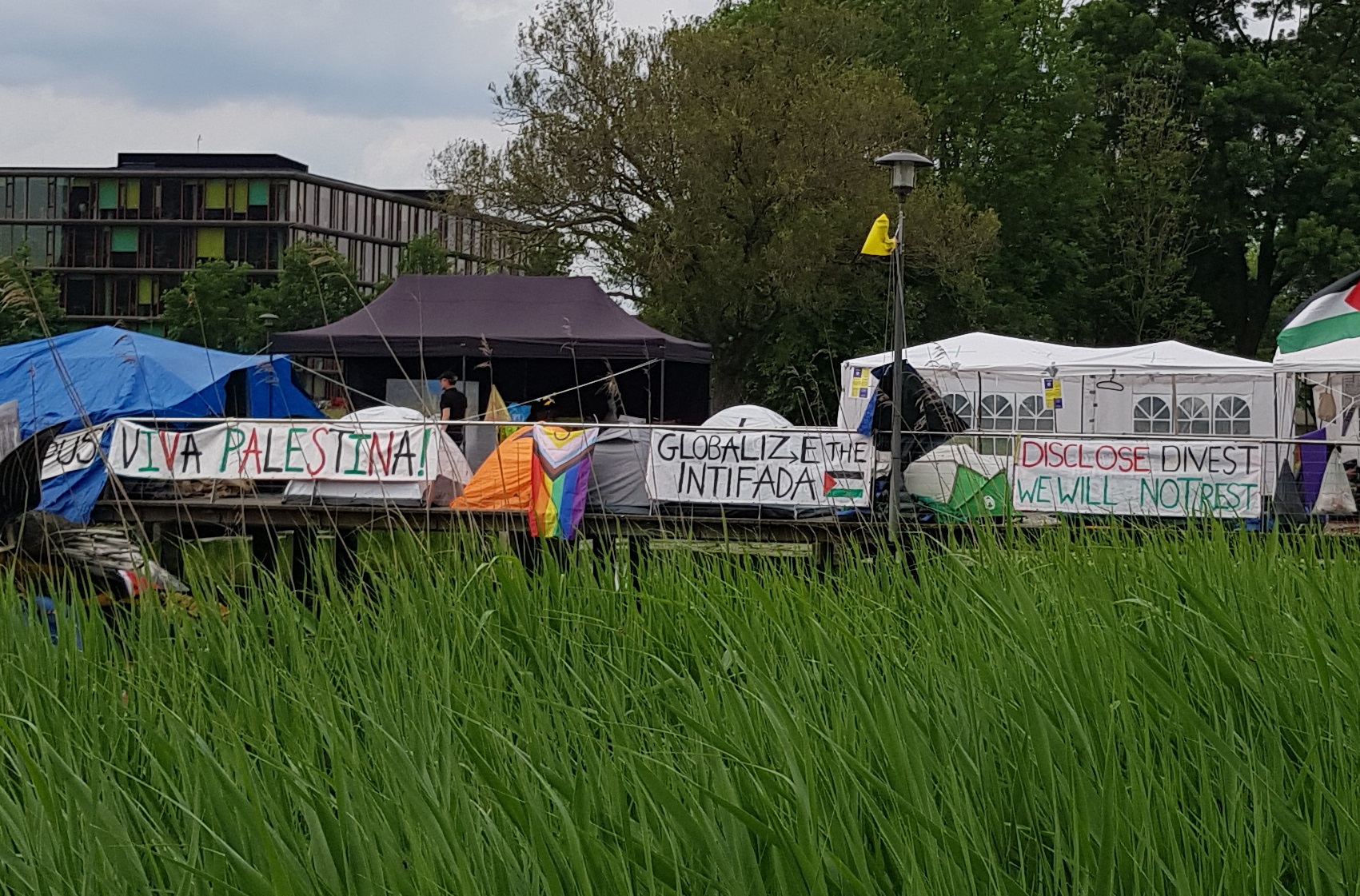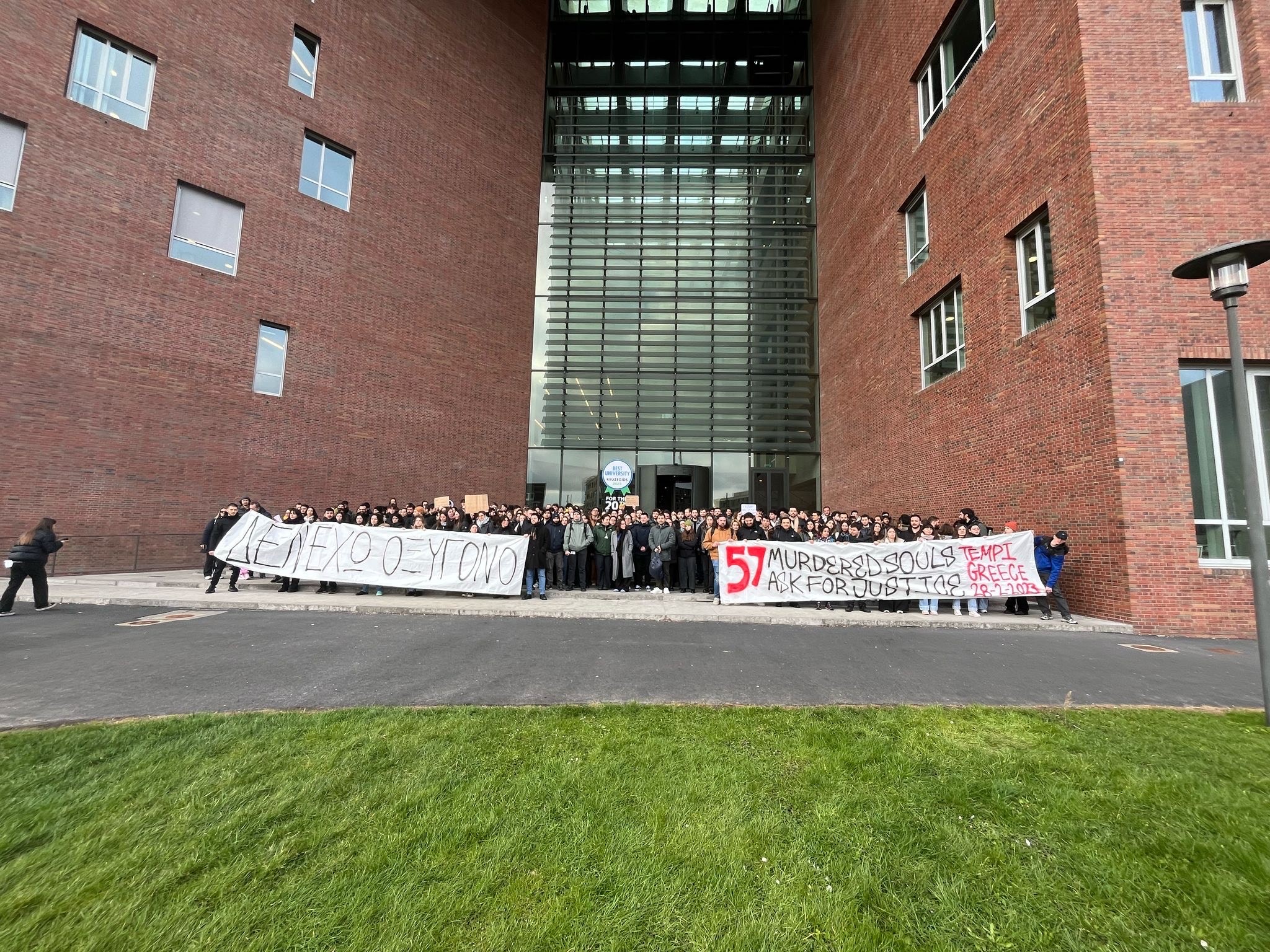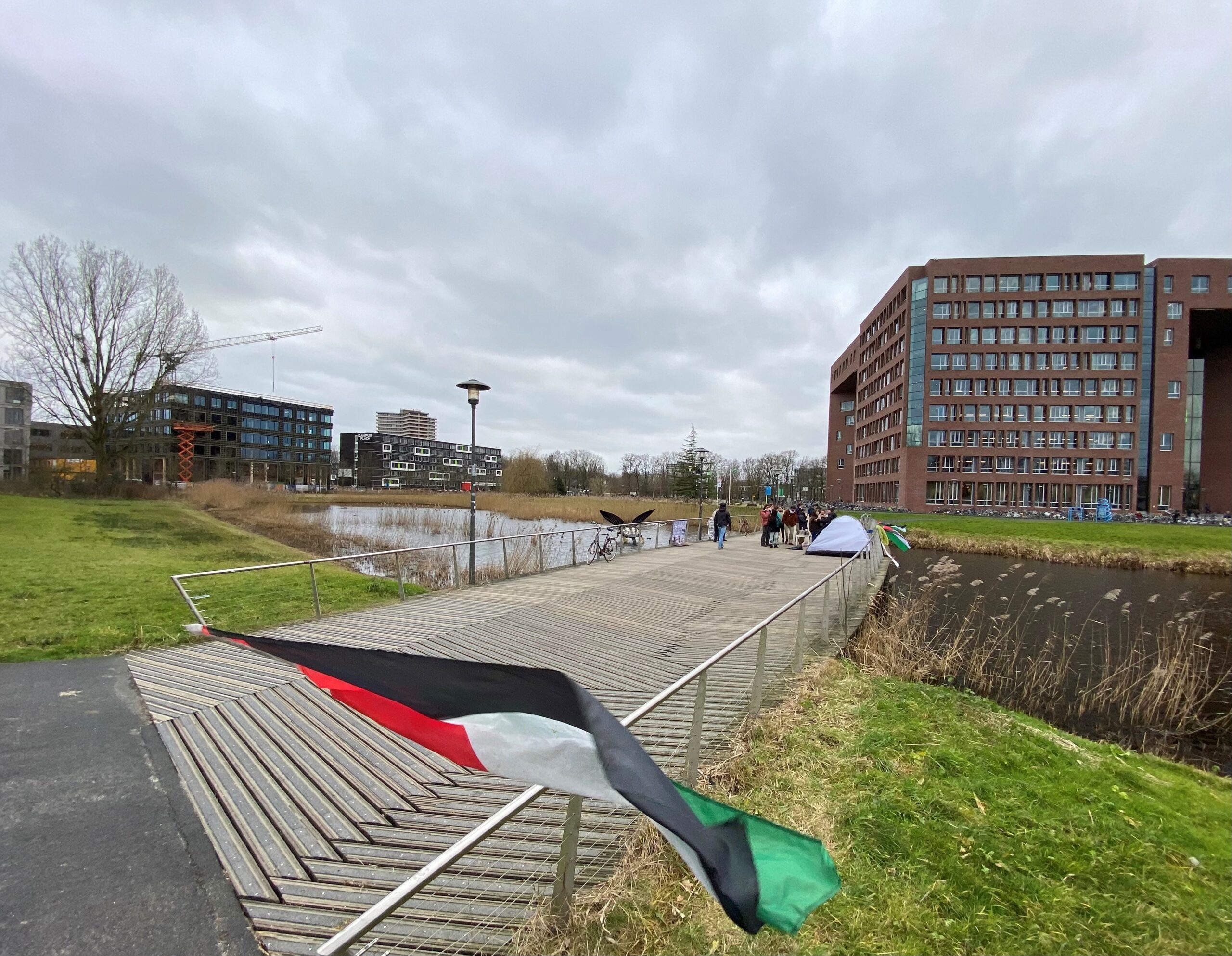A part of the Jewish students and staff community at WUR have been feeling unsafe on campus for some time now. In a meeting with President of the Executive Board Carolien Kroeze, they asked for measures to be taken to guarantee their safety. For example, they want the Executive Board to set limits on what can be said by the pro-Palestinian activists who have been camped on the bridge next to the Forum since last Wednesday.
Dror Shalit, a third-year Master’s student who says is the spokesperson for the Jewish and Israeli community, which consists of about 20 people, first contacted the Executive Board last December. That led to a meeting with the then rector Arthur Mol at the start of this year. But it produced few results. Last Thursday, they spoke with the new rector, Carolien Kroeze.
Resource talked to Dror Shalit and first-year Master’s student David Cohen about the situation. Both lost friends and acquaintances in the attack by Hamas on 7 October last year.
What is it that makes the Jewish community feel unsafe on campus?
Shalit: ‘It is not a question of physical or verbal threats. It is a feeling of unsafety fuelled by actions such as currently on the bridge near Forum. We experience the slogans used by the activists as threatening. They call for an intifada and use slogans like “from the river to the sea”.’
Cohen: ‘Intifada means uprising. Of course that is what is happening from the Palestinians’ perspective. But for us, intifada is a threatening word. When I was growing up in Israel, my mother wouldn’t let me near a bus because Hamas used to blow up buses. Lots of Palestinians and Jews died due to the Intifada. Calling for a worldwide intifada, as one of the banners does, would mean we would not be safe anywhere anymore. The slogan “from the river to the sea” means the destruction of all Jews living between the River Jordan and the Mediterranean Sea. The activists use the Palestinian flag. What do you think would happen if we started waving the Israeli flag?’
Do you publicize your Jewish roots?
Shalit: ‘No, no. We hide it. At home, I usually wear a kippah, but definitely not outside the home. I keep that side to myself because I’m afraid otherwise something will happen.’
Are you able to discuss the conflict in Gaza with students and staff?
Shalit: ‘Yes, but I don’t initiate the discussion myself because I know it’s a polarizing topic. If someone asks a question, I give my opinion but I don’t start such discussions. I don’t feel the need either. This is not new for us. We grew up with the conflict and and are familiar with the nuances. We have been talking about it all our lives.’
What do you want the Executive Board to do?
Shalit: ‘We want them to set limits on the protests: limits specifying what is allowed and what not. Those limits are currently being violated. The calls for an intifada are threatening. The slogan “no justice, no peace” crosses a boundary. It means the violence will continue, and there will be no peace, for as long as there is no justice for Palestinians. The slogan “from the river to the sea” crosses a boundary.’
Cohen: ‘We also asked for safety. We want to know what we can do to make sure we are safe and we want to know what the university will do to help us. If we don’t speak out about this, the situation will only get worse.’
Shalit: ‘We also want something to be done about the one-sided perspective on the conflict in meetings on campus. If you want to facilitate an academic discussion about the conflict, representatives of both sides should be invited. We are prepared to step up as representatives of the Israeli side.’
Is that a call for a dialogue?
Cohen: ‘Yes please. But one that is facilitated by the university so we feel safe. That would be an amazing opportunity for Wageningen. The protests haven’t escalated here like they did in Amsterdam. The activists say they are peace lovers, and we are peace lovers. This is a chance to show the two sides can talk to one another. Not to debate the issue, because debating leads to polarization. We want to talk to the activists person to person.’

 Photo Resource
Photo Resource 


I think it’s extremely problematic that someone who calls himself “the spokesperson of the Jewish and Israeli community in Wageningen” claims that calling for justice for Palestine is crossing a boundary. Obviously, there are Jews and Israelis – in the Netherlands, in Israel, and all over the world – calling for a just peace in Israel/Palestine, and using these so-called “problematic” slogans. Resource, please do a better job of checking people’s claims of their supposed titles. Respectfully, the spokesperson of the queen.
Thanks for your feedback David, valuable for our reporting. To be continued.
A suggestion for Resource to do a better job. A more honest title of this article should have had the work CERSORSHIP instead of dialogue.
I wonder where the idea that there are only 20 of us in the Jewish community at WUR comes from. I’m sure there are FAR more. I also am not aware of any organized community and spokesperson for us. I’d be curious to hear from more perspectives.
But I will add that I, too, feel unsafe. There’s a reason I no longer where a Jewish star necklace on our campus- it’s a deep feeling of fear within me that only other Jews will understand. I also feel that defining the lines for peaceful protest is incredibly hard to do and I have no desire for censorship of peaceful actions. I do not envy the position of the executive board in trying to keep us all feeling heard and safe.
But will things remain peaceful? As a Jew I will never never be comfortable as the Europeans around me began to decry Zionism with such anger, when they clearly still have no idea what it means.
Dear Liana,
Thank you so much for your openness in your response. I want to carefully to bring to light the following counter arguments:
I understand the deep concerns and fears expressed by many within the Jewish community, especially in a climate where expressing one’s identity can sometimes feel risky. However, it’s important to recognize the fundamental rights and principles that allow us to engage in these discussions and protests peacefully.
The protests we see on campus are a manifestation of the freedom of speech that is a cornerstone of our society here in the Netherlands. This freedom allows individuals to express their concerns, opinions, and calls for change in a non-violent manner. It’s a privilege that we must not take for granted, as it enables us to address issues openly and constructively.
Peaceful demonstation is a pivotal aspect of democratic engagement. It provides a platform for diverse voices to be heard and for grievances to be aired without resorting to violence or coercion. This approach aligns with the values of respecting other’s opinion and engaging diversified dialogue that the academic community strives to uphold. By maintaining a commitment to peaceful actions, we ensure that the public debate remain constructive and focused on spreading understanding and change.
It’s also crucial to differentiate between criticism of political ideologies and personal attacks on individuals or groups. The anger directed at Zionism by some is often a critique of a political stance rather than an attack on Jewish identity. Ensuring this distinction is understood and respected can help mitigate feelings of fear and alienation.
Thank you once again for being so open and daring in sharing your feelings and experiences. It takes courage to voice such personal concerns, and your honesty helps foster a deeper understanding within our community.
Wow Liana. Saying that “the Europeans around you” have no idea what Zionism means is such a condescending and generalizing comment that I don’t even know where to begin. Surely it has not been only Jews that have defined and shaped Zionism, and surely Jews are not the only ones that had to endure with its consequences. One could claim that in comparison to Palestinians, it is most Jews who have no idea what Zionism means
To quote the (Jewish) theorist Judith Butler: “any student who says “I feel unsafe by what I hear another student say” is saying that “My security and safety is more important than that person’s freedom of expression.” And if we countenance that, if we give too much leeway to that claim that a student feels unsafe because, say, an anti-Zionist — or a statement in support of Palestine, or a statement opposing genocide makes that Jewish student feel unsafe, we are saying that that student is perceiving a personal threat or is threatened by the discourse itself — even when the discourse is expressive rather than portending physical harm….if calling for an end of genocide against Palestine is understood as making a Jewish student feel unsafe, then we see that the safety of the situation has been oddly co-opted by that particular Jewish student. It’s as if they are being threatened with harm when, in fact, the opposition to the genocide in Gaza is quite explicitly an opposition to doing harm and killing numerous people who are huddled in Rafah looking for safety.” https://theintercept.com/2024/05/01/judith-butler-israel-hamas-freedom-speech/
If someone says: ‘I feel unsafe by what I hear another student say’, the person is saying exactly that and no more. It is a statement of feeling and emotion as perceived by that person and doesn’t imply prioritisation of security over freedom of expression. If ms. Butler chooses to interpret it as such, that’s on her.
You are wrong, and also full of hubris and arrogance to misgender and dismiss PROFESSOR Butler, a pre-eminent feminist philosopher.
You must have your head in the sand to ignore the implications of the weaponisation of ‘unsafety’ on campuses all over the world, as police literally physically assault students in the supposed name of campus safety.
How am I wrong?
Just to inform you: yesterday the Dutch parliament passed a resolution to penalize the use of the slogan ‘from the river to the sea’.
The fact that a motion has been passed has absolutely no value in this discussion. The motion passed expresses an opinion of the Dutch parliament, and has no binding or legal rammifications whatsoever. In fact, this exact statement has already been tested in a Dutch court and found to be within the boundaries of free speech and not in violation of the law in 2023: https://uitspraken.rechtspraak.nl/details?id=ECLI:NL:GHAMS:2023:2271.
Hi Tijmen, I shared this info just to stress that the idea (or demand) of Dror and David to ban certain phrases are not that far-fetched as it may seam. In this respect it adds value to the discussion. It does not reflect my personal opinions on the subject.
Are you actually as a journalist suggesting than banning phrases ‘is not far-fetched’?!? Incredible.
What is your point Roelof? Are you celebrating this? How downright disgusting that the Netherlands is not only complicit in the physical erasure and genocide of the Palestinian people, but now also wants to erase their slogans and history. By the way, presumably if this Israeli minister ever visits the Netherlands he will be arrested for his use of the phrase? https://www.haaretz.com/israel-news/2024-05-22/ty-article/.premium/netanyahu-minister-to-nations-recognizing-palestine-only-israel-from-river-to-sea/0000018f-a0fc-d4c6-a5cf-f2fd3d0c0000
It concerns and saddens me to read that a group of students and colleagues feels unsafe at the campus, to the extent that they hide visible tokens of their identity. Even though no physical harm is in play, this should not be taken lightly because ‘social safety is the highest priority at WUR’ (https://www.wur.nl/en/about-wur/our-values/social-safety.htm).
One of the signs on the campus bridge reads: ‘No one is free untill Gaza is free’ (or along those lines). To this, I’d like to add: ‘No one on WUR campus should feel comfortable until everyone on WUR campus enjoys social safety’ (not as snappy as the former, I know).